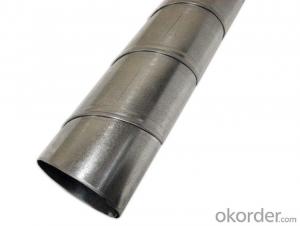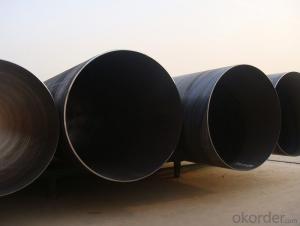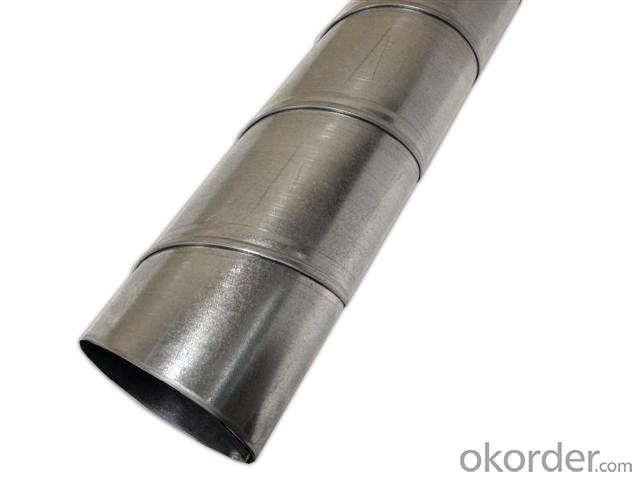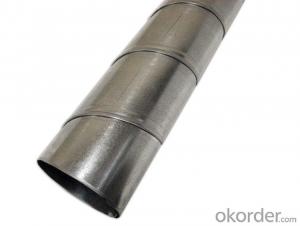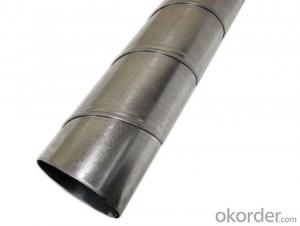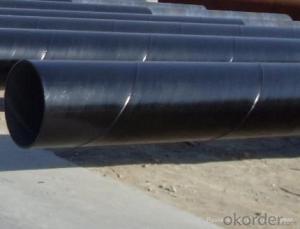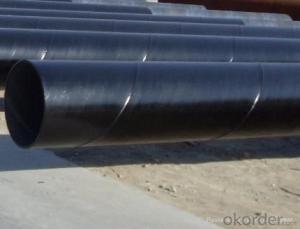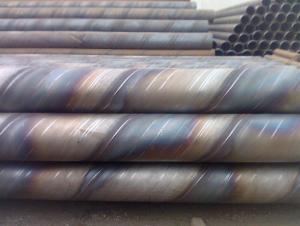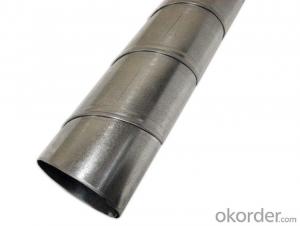SPIRAL STEEL PIPE 24’‘26‘’ 28‘’ 32‘’LARGE DIAMETER PIPE
- Loading Port:
- Tianjin
- Payment Terms:
- TT OR LC
- Min Order Qty:
- 5 m.t.
- Supply Capability:
- 3000 m.t./month
OKorder Service Pledge
OKorder Financial Service
You Might Also Like
Packaging & Delivery
Packaging Detail: | standard export packing or as customer's requirement |
Delivery Detail: | within 10 - 30 days |
Specifications
Spiral Welded Steel Pipes and Tubes
1.Material:Q195-Q235
2.Length:1-12m
3.WT:1.0-14mm
4.O.D.:20-273mm
Spiral Welded Steel Pipes and Tubes
Product Description:
1.Material : Q235,Q345,L245,L290,L360,L415,L450,L485,GrB,X42,46,X52,X56,X60,X65,X70,X80,X100
2,Standard: SY/T5037-2000,GB/T9711-2011,API Spec 5L PSL1/PSL2,ASTM A252\A53,ISO3183,DIN17172,EN10217,JIS G3457,AWWA C200,ASTM A139,ASTM A671,ASTM A672
3.Wall thickness: 3.0mm-30mm
4.Outer diameter: φ168mm-3020mm
5,Length: 5m-12m or as your requirement
6,Corrosion protection standard: DIN30670,DIN30671, AWWAC210, AWWA C203, SY/T0413-2002,SY/T0414-2002
7,Application: Oil, gas, natural gas, water pipe, thermal electricity pipe, steel structure engineering, etc
Q195-q345 Material Steel Pipe's Materials
Elements | Chemical Compsition% | Mechanical Property | ||||||
C% | Mn% | S% | P% | Si% | Yield Point (Mpa) | Tensile Strength(Mpa) | Elongation | |
Q195 | 0.06-0.12 | 0.25-0.50 | <0.050< span=""> | <0.045< span=""> | <0.030< span=""> | >195 | 315-430 | 32-33 |
Q215 | 0.09-0.15 | 0.25-0.55 | <0.05< span=""> | <0.045< span=""> | <0.030< span=""> | >215 | 335-450 | 26-31 |
Q235 | 0.12-0.20 | 0.30-0.70 | <0.045< span=""> | <0.045< span=""> | <0.030< span=""> | >235 | 375-500 | 24-26 |
Q345 | <0.20< span=""> | 1.0-1.6 | <0.040< span=""> | <0.040< span=""> | <0.55< span=""> | >345 | 470-630 | 21-22 |
- Q: What are the common applications of steel pipes in the water distribution system?
- Steel pipes are commonly used in water distribution systems for various applications such as transporting water from treatment plants to homes, buildings, and industries, as well as for underground water mains and fire hydrant systems.
- Q: How are steel pipes used in the manufacturing of conveyor systems?
- Steel pipes are commonly used in the manufacturing of conveyor systems as they provide a strong and durable structure for transporting materials. These pipes are used to create the framework and support structure of the conveyor system, allowing for the smooth movement of goods from one place to another. Additionally, steel pipes can be welded together to create longer sections, making them ideal for constructing lengthy conveyor systems.
- Q: How are steel pipes threaded?
- Steel pipes can be threaded using a process called threading. Threading is the process of creating screw-like grooves on the outer surface of the pipe, which allows it to be connected to other pipes or fittings using threaded connections. There are several methods for threading steel pipes, including manual threading, electric threading machines, and hydraulic threading machines. In manual threading, a handheld pipe threading tool called a die is used. The die is placed on the outside of the pipe, and the pipe is rotated while pressure is applied to create the threads. This method is suitable for small diameter pipes and is typically used for on-site repairs or in small-scale operations. Electric threading machines are commonly used for larger diameter pipes. These machines consist of a motor-driven spindle, which rotates the pipe, and a die head that holds the threading dies. The operator simply feeds the pipe into the machine, and the threading dies cut the threads onto the pipe automatically. Hydraulic threading machines are similar to electric threading machines but use hydraulic power to rotate the pipe and create the threads. These machines are typically used for larger diameter pipes or in heavy-duty applications. Regardless of the method used, it is important to ensure that the pipe is properly prepared before threading. This may involve cleaning the pipe, removing any burrs or sharp edges, and applying a lubricant to reduce friction during the threading process. Overall, threading is a common and efficient method for creating threaded connections on steel pipes. It allows for easy assembly and disassembly of pipes and fittings, making it a popular choice in various industries such as plumbing, construction, and oil and gas.
- Q: Can steel pipes be used for oil and gas transportation?
- Yes, steel pipes can be used for oil and gas transportation. Steel pipes are widely utilized in the oil and gas industry due to their strength, durability, and ability to handle high-pressure conditions. They are commonly used for transporting crude oil, natural gas, and their derivatives over long distances. Steel pipes have excellent resistance to corrosion and can withstand extreme temperatures, making them suitable for both onshore and offshore applications. Additionally, steel pipes can be easily welded, allowing for the construction of complex pipeline networks that efficiently transport oil and gas from production fields to refineries and distribution centers.
- Q: Are steel pipes suitable for wastewater pumping stations?
- Yes, steel pipes are suitable for wastewater pumping stations. Steel pipes have excellent strength and durability, making them capable of withstanding the corrosive nature of wastewater and the high pressure involved in pumping. Additionally, steel pipes are resistant to extreme temperatures and can handle the heavy loads commonly associated with wastewater systems.
- Q: Are steel pipes suitable for solar power plants?
- Yes, steel pipes are suitable for solar power plants. Steel pipes are often used in the construction of solar power plants due to their durability, strength, and resistance to corrosion. They can be used for various purposes in a solar power plant, including the transportation of fluids such as water or heat transfer fluids, as well as providing structural support for solar panels and other equipment. Steel pipes are capable of withstanding high temperatures and pressure, making them ideal for the efficient operation of solar power plants. Additionally, steel pipes are readily available and cost-effective, making them a popular choice in the construction of solar power plants.
- Q: How are steel pipes used in the water treatment industry?
- Steel pipes are used in the water treatment industry for various applications such as transporting water from the source to the treatment plant, distributing treated water to consumers, and conducting tests and inspections of the water quality.
- Q: What is the difference between steel pipe and concrete pipe?
- The main difference between steel pipe and concrete pipe lies in their material composition. Steel pipes are made from steel, which provides strength, durability, and resistance to corrosion. On the other hand, concrete pipes are made from a mixture of cement, aggregates, and reinforcing materials, offering advantages such as fire resistance and the ability to withstand high pressure. While steel pipes are commonly used for transporting fluids and gases, concrete pipes are often used in drainage and sewage systems.
- Q: How are steel pipes repaired if they develop leaks?
- Steel pipes can be repaired if they develop leaks through various methods such as welding, clamping, or using epoxy compounds. The specific repair technique depends on the size and location of the leak as well as the type of pipe, and it is typically carried out by trained professionals with the necessary equipment and expertise.
- Q: What are the factors to consider when selecting a steel pipe for a specific application?
- When selecting a steel pipe for a specific application, there are several factors that need to be considered. These factors include the required strength and durability, the intended use and environment, the size and dimensions needed, the corrosion resistance properties required, the temperature and pressure conditions, and the budget available for the project. By taking all these factors into account, one can choose the most suitable steel pipe that meets the specific requirements of the application.
Send your message to us
SPIRAL STEEL PIPE 24’‘26‘’ 28‘’ 32‘’LARGE DIAMETER PIPE
- Loading Port:
- Tianjin
- Payment Terms:
- TT OR LC
- Min Order Qty:
- 5 m.t.
- Supply Capability:
- 3000 m.t./month
OKorder Service Pledge
OKorder Financial Service
Similar products
Hot products
Hot Searches
Related keywords
